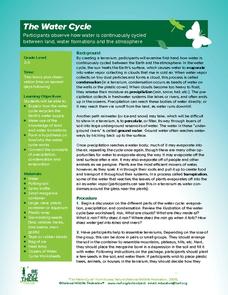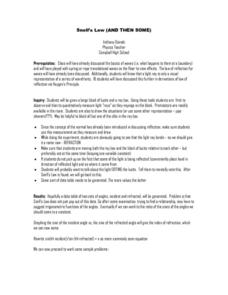Curated OER
Energy in Living Systems
High schoolers are asked: Is our life's purpose over when it's over? What happens to our bodies? They analyze the flow of energy through living systems. Students compare the metabolism of autotrophs with that of heterotrophs. They...
Curated OER
The Water Cycle
Learners are introduced to the components and importance of the water cycle. They are shown how groundwater moves using a model. Students list 9 places on earth where water is found. They define the terms cycle and water cycle.
Curated OER
Oil and Gas As A Source of Energy
Students discuss the reasons why oil and gas are the United States' main source of energy. In groups, they use the internet to research how the resources are formed and the amount of consumption by the United States. They choose books...
Curated OER
Forms of Energy
Fifth graders brainstorm what forms of energy are used in an energy bike listing them on the board with the description placed beside each form for reference. They work in pairs to diagram the energy transformations that occurred while...
Curated OER
Mechanical Properties of Chocolate: How Hard is your Chocolate?
High schoolers calculate, measure and identify the hardness of various chocolate bars. They determine the hardness of the chocolate bar using quantitative data. Students make observations of the hardness of chocolate while dropping the...
Curated OER
Introduction to Nutrition
Fourth graders plan nutritional meals by using the USDA's Food Guide Pyramid and analyze food labels to aid in this planning. Using a slice of Wonderbread they discover what a calorie means, and that being active means burning up more...
Curated OER
Kinetic Vs. Potential Energy
Eighth graders listen to a teacher lecture and observe a demonstration of both potential energy and stored energy. After discussing the characteristics and examples of different types of energy, 8th graders make predictions and then...
Curated OER
Energy Is Everywhere
Students determine the difference between renewable and non-renewable resources and identify the different forms of energy. They discuss life without energy and where energy comes from before reading an article about the different...
Curated OER
Potential and Kinetic Energy
Fifth graders explore how energy changes from one form to another within their surroundings. They explore how kinetic and potential energy relate to each other and the ability to do work. Students observe example of both kinetic and...
Curated OER
Snell's Law (And Then Some)
Students conduct an experiment to test Snell's Law using a block of lucite and a ray box. They measure the light rays as they impinge upon the block. Students are also asked to draw the situation of the lab or create a model of the...
Curated OER
Fossil Fuels vs. Alternative Fueling Systems
Fourth graders brainstorm the differences between the fossil fuels that people use in their transportation now and what they could use to minimize greenhouse gas emissions. They use a variety of techniques from webquests to writing...
Curated OER
Insulators And Conductors
High schoolers investigate the flow of electricity and how it effects different objects in the classroom as being classified as an insulator or conductor. They work in teams to test the conductivity of different classroom objects after...
Curated OER
Magnetism And Electricity
Students investigate the concept of electricity and how to build a circuit. They identify the presence of heat, light, sound, and the magnetic effects. Students construct the circuit and draw a diagram that gives directions for its...
Curated OER
Wave Properties
Students identify how waves transfer energy without transferring matter. They contrast transverse and compressional waves and relate wave speed, wavelength, amplitude and frequency. Lesson includes PowerPoint presentation.
Curated OER
Where Did The Electricity Go?
Ninth graders identify problems and research potential solutions regarding the efficiency of energy use. They examine the potential problems associated with the use of electrical appliances. They brainstorm about practical problems...
Curated OER
Lesson 2: Energetic Ideas
Pupils review what they know about energy safety, identify potential safety hazards associated with use of electricity and natural gas, and recognize that scientific information can be communicated in various ways by creating comic...
Curated OER
Thinking about Energy
Young scholars examine their understandings about energy concepts by completing an online survey. Students participate in a class discussion about their uses of resources and the differences between perpetual, renewable, and...
Curated OER
Conservation of Momentum Experiment
Young scholars conduct an experiment dealing with momentum, energy and collisions in order to collect usable data sets. Data sets gathered are graphed and used to calculate conservation of momentum, amount of energy change, and classify...
Curated OER
Solar Kit Lesson #1 Solar Cell Inquiry
Students use a selection of solar panels, lamps, motors, and an AA battery to get as many motors or lights to operate as they can in an allotted time period. For each successful arrangement, they draw a diagram of their setup, label the...
Curated OER
Capacitors
Students explain the concepts of charge storage and how a capacitor works. They construct a capacitor and measure the stored charge using the appropriate equipment and measurements. They also demonstrate capacitance and how it can be...
Curated OER
Energy
Students distinguish between kinetic an potential energy. They recognize that energy is conserved when changing from one form to another. Students compare the scientific meaning of work with its everyday meaning.
Curated OER
Momentum and Energy
Students study how to calculate momentum, kinetic, and potential energy. They apply each form of energy to real world situations including demonstrations, watching videos, and designing a Power Point presentation. They investigate in...
Curated OER
Power: Work and Energy
Students explore how work and energy create power. They complete activities involving simple machines, energy, energy conversion, and the role of conductors and insulators. They choose from a menu of options the activities they would...
Curated OER
Force/Newton's Laws/Friction
Students describe how to recognize a force, define balanced and net forces, state Newton's first law of motion, explain why friction works, state Newton's second Law of Motion, and explain why the direction of force is important.

























